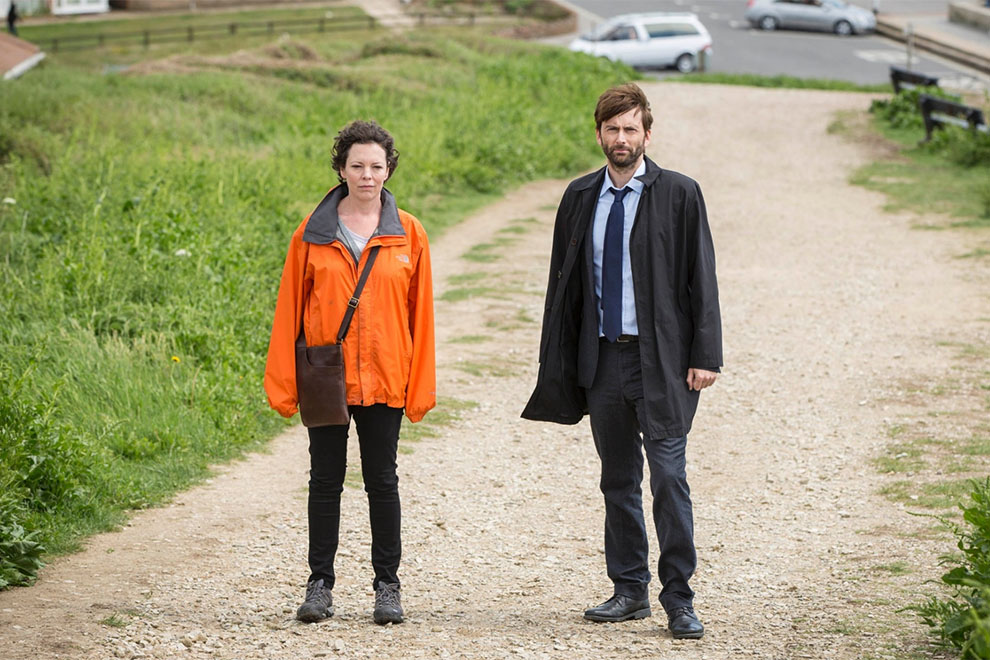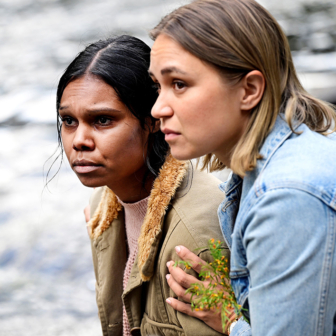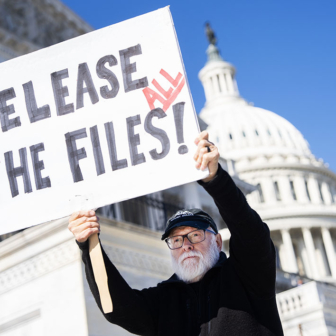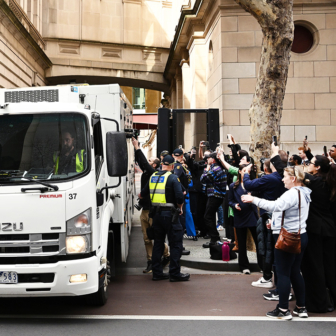“You know, in this place things can come at you from nowhere. Monsters. You won’t see them, you won’t hear them, until they have you in their teeth. And then they’re gone, into the darkness.” The place is Fortitude, the semi-fictional Arctic location of a new twelve-part British crime series showing on ABC1 on Sunday nights.
Over the past few years we have seen a growing craze for television thrillers in which location is a defining element. It’s a genre with hot competition in the DVD market, and somehow Nordic locations seem to have the edge. The Danish series The Killing (2007) set the bar high with dramatic acting of exceptional subtlety, tight scripting and imaginative photography. The Bridge (2011), a Swedish–Danish collaboration, matched the production standards and added to the atmospheric intensity with a haunting soundtrack by a group called Choir of Young Believers, who create hymn-like chants with a ringing metallic edge. Fortitude has all the makings of another tour de force, with music from the Icelandic-Australian composer Ben Frost, and Sofie Gråbøl, who starred in The Killing, in the role of the territory governor.
As the location for a psychological thriller, the Arctic is in a class of its own. Ultramarine nights, stark white days, ghostly mountain shapes looming in the background, ice roads veering off into nowhere – and the monsters you never see coming. Those lines, spoken in a whisper to one of the town’s newcomers, seem to be laying claim to a tradition of the Icelandic sagas that goes back to the early middle ages. In this place, your enemy may be man or beast, natural or supernatural, and you may be unable to tell the difference.
In the overworked terrain of the crime thriller, whodunnit is no longer, in itself, a gripping question. What draws you in is the sense of a world in which strange and unpredictable things can happen, and an identification with those figures at the centre of it who are trying to work things out. The camera is another player in the game, moving into scenes ahead of the characters, or tracking slowly across the strange skies as if the meaning of it all lies somewhere up there.
Fortitude commences with a set of apparently unrelated incidents. A child arrives home and collapses from some unidentified illness. An old man with a rifle stands on the ice floes, aims at a polar bear eating another man alive, but misses and shoots the victim. Two young guys on the make find part of a mammoth skeleton and decide to try to sell it. The town’s governor prepares to address a convention of investors from the tourist industry, whispering to herself the keynote message: “Thrills and magic! Thrills and magic!” The narrative strands that link these incidents are woven through nice touches of behavioural detail suggesting that some bizarre overarching pattern is emerging. And the local sheriff – who has a way of cropping up everywhere, without anyone seeing or hearing him coming – will be doing some weaving of his own. With another nine episodes to go, it will be a while before we see what the pattern is, but the pacing so far is beautifully judged.
Fortitude is being aired as a Sunday night double bill with series two of Broadchurch, the highly successful crime drama made for ITV in Britain (and remade in the United States as Gracepoint). Broadchurch is set in a Dorset town, near the cliff face, on a stretch of shoreline known as the Jurassic Coast. This is southern England, but the call of the north is still heard through the music by Icelandic musician Olafur Arnalds that accompanies the unfolding events. For scriptwriter Chris Chibnall, the Dorset setting was essential to the program’s conception. In a recent interview for The List on Radio National, he pointed to its cultural resonances as “Hardy country,” and drew attention to the fact that one of the characters is reading Jude the Obscure. Thomas Hardy’s novels manage to combine psychological tension with a relentless fatalism that seems to be bred in the very soil of the countryside. A sense of deep history residing in the land, and of the tyrannical forces of the natural world, is something Broadchurch and Fortitude have in common, though where Broadchurch is concerned, I find myself becoming a bit sceptical as the second series unfolds.
An overconscious attempt to invoke the spirit of place through an assemblage of the requisite elements is marred by the fact that the elements don’t quite blend. Icelandic music draws on the folkloric and mythological traditions of the North Sea, and on ethereal plainchant from Christian church music. Its echoic quality evokes a reign of cold and darkness. This is not Dorset, where wind and light and seasonal change punctuate the human dramas. The series is promoted with comparisons to David Lynch’s Twin Peaks, which belongs to another geographical zone again, but I couldn’t equate the relatively dense and bustling town life of Broadchurch with the wacky remoteness of Lynch’s world.
Broadchurch was filmed in a range of towns and cities, including Bristol and the terminally unpoetic Reading. It doesn’t necessarily matter where a cafe scene is filmed if the cafe has the right look to it, of course, but spirit of place is a nebulous quality, requiring a certain level of commitment to a location and its history. In the American remake, which was filmed in the small town of Oak Bay on Victoria Island off the coast of Canada, the cafe and hotel interiors are lined with rich red wood that is in itself a local presence. The sparseness of the population there accentuates the feeling of isolation in the fictional community. Weather, tides, animals and human lives are bound together, and there are shots of a whale breaching off shore in the darker moments, as if somehow the cause of all the sinister developments might lie there.
The American version echoes the surrealist poetics of David Lynch in ways that the British series can’t. Some of the characters also work better, notably the sour-faced elder played by Pauline Quirke in Broadchurch and Jackie Weaver in Gracepoint. Quirke can generate real dramatic power on television: she was unforgettable in the title role of the Minette Walters thriller The Sculptress (1996), and she has a track record as a comedian through her decade-long engagement with the sitcom Birds of a Feather. In Broadchurch, she’s little more than a prototype, with an all-too-familiar manner and accent. But Weaver gets under the skin of this weird, stray personality and suggests emotional layers that can’t be accessed.
David Tennant heads the cast in both versions. He’s an actor with a brilliant instinct for pitching a television performance. Known as “the Tennant” during his time in Doctor Who, he extended the Doctor’s emotional register without losing the mystique, and his ability to combine a touch of self-parody with psychological commitment suits the detective role perfectly. As his assistant, Olivia Colman portrays a woman stoically holding her own through an emotional rollercoaster, her face registering every nuance of alternating bewilderment and hard-grained persistence.
Series one lost its way towards the end with a recurrent pattern of imploding families – husbands gone bad, children tragically lost. I keep wanting to invoke a version of Oscar Wilde’s dictum: to lose one family might be regarded as misfortune, but to lose three looks like carelessness. Or to put it another way, it looks like losing the plot. The wrap-up followed the convention of making the killer the last person you’d suspect, and it’s a convention that usually involves wrenching probabilities.
In series two, the case reopens. Did he really do it after all? But how much more mileage can they really get out of this already overstretched story? Charlotte Rampling is brought in to lend some authority to the court scenes, and by episode three the legal drama has got some traction, but the poetry, what there was of it, has gone. •




